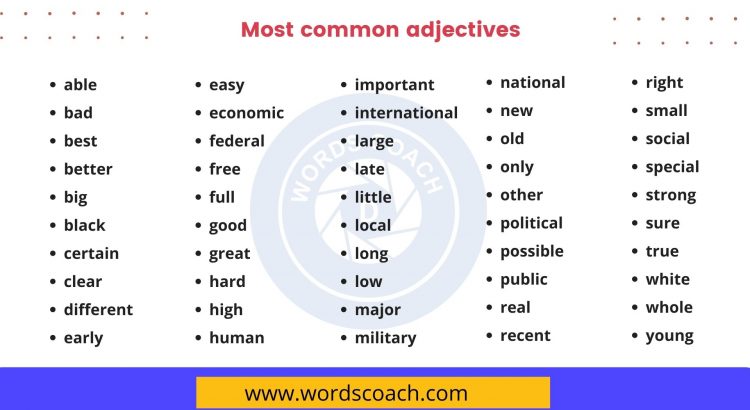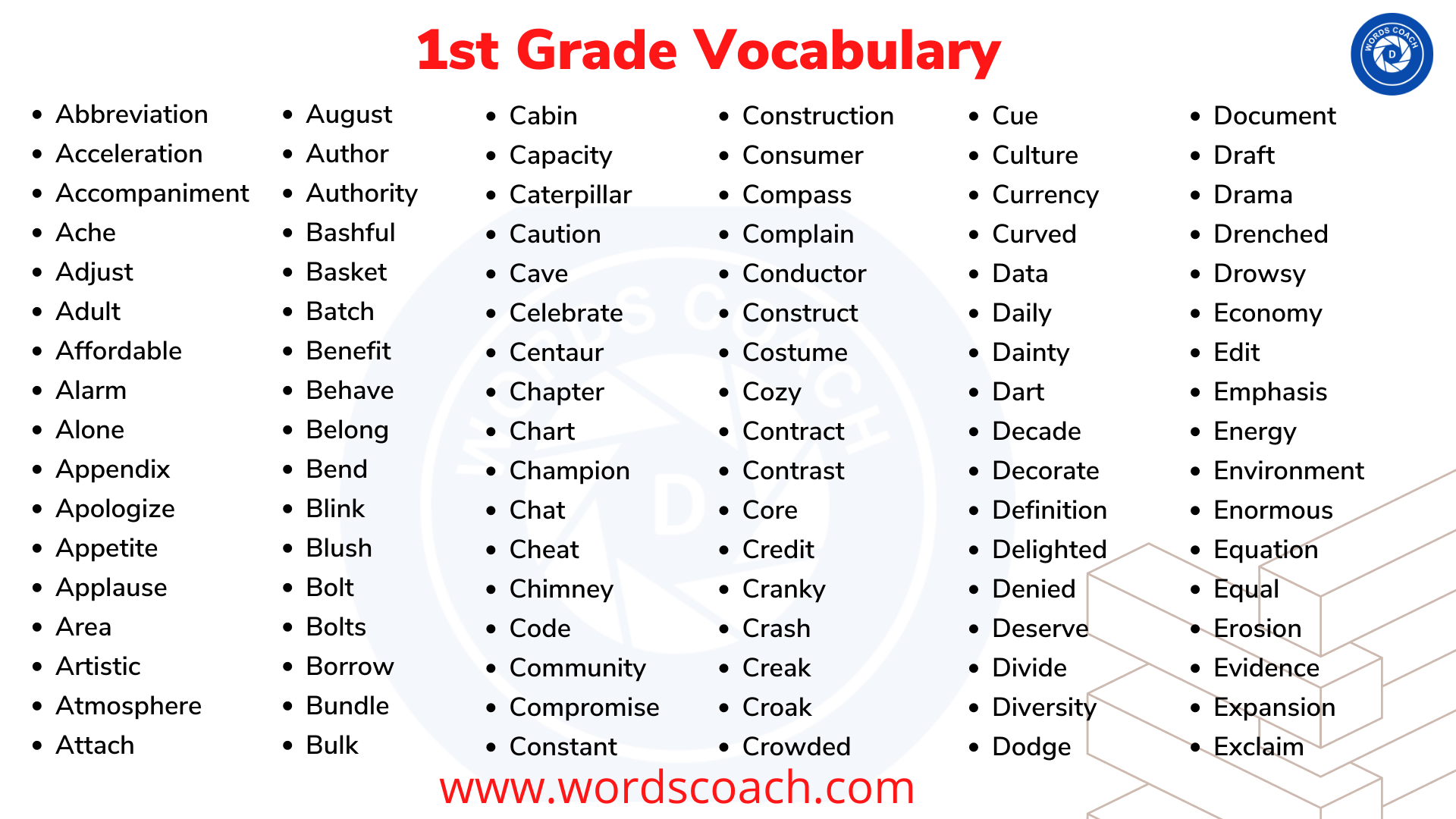A list of the 50 most frequently used adjectives in English is a good place to start expanding your English vocabulary. Adjectives add precision to your language skills, but you don’t necessarily need to have an enormous collection right from the start.
List of Most Common Adjectives in English
- able
- bad
- best
- better
- big
- black
- certain
- clear
- different
- early
- easy
- economic
- federal
- free
- full
- good
- great
- hard
- high
- human
- important
- international
- large
- late
- little
- local
- long
- low
- major
- military
- national
- new
- old
- only
- other
- political
- possible
- public
- real
- recent
- right
- small
- social
- special
- strong
- sure
- true
- white
- whole
- young
Most Common Adjectives in English | Image

Most Common Adjectives with Meaning and Examples
able
- Meaning: Having the power, skill, means, or opportunity to do something.
- Example: She is able to complete the project on her own.
bad
- Meaning: Of poor quality or a low standard; not good.
- Example: The weather was bad all week, so we stayed indoors.
best
- Meaning: Of the highest quality, excellence, or standing.
- Example: This is the best cake I have ever tasted.
better
- Meaning: Of a higher quality, more effective, or more advantageous than another.
- Example: Her health is getting better each day.
big
- Meaning: Of considerable size, extent, or intensity.
- Example: They moved into a big house in the countryside.
black
- Meaning: Of the darkest color, the opposite of white; having no color.
- Example: He wore a black suit to the formal event.
certain
- Meaning: Known for sure; established beyond doubt.
- Example: I am certain that we will win the game.
clear
- Meaning: Easy to perceive, understand, or interpret.
- Example: Her instructions were clear and easy to follow.
different
- Meaning: Not the same as another or each other; unlike in nature, form, or quality.
- Example: Each student had a different perspective on the topic.
early
- Meaning: Happening or done before the usual or expected time.
- Example: She arrived early to get a good seat.
easy
- Meaning: Achieved without great effort; presenting few difficulties.
- Example: The test was easy, and everyone passed.
economic
- Meaning: Relating to economics or the economy.
- Example: The economic policies of the government have improved the job market.
federal
- Meaning: Relating to the central government, as opposed to local or state government.
- Example: The federal government passed a new law.
free
- Meaning: Not under the control or power of another; able to act or be done as one wishes.
- Example: The students were free to choose their own topics for the essay.
full
- Meaning: Containing or holding as much or as many as possible; having no empty space.
- Example: The bottle was full of water.
good
- Meaning: To be desired or approved of; having the required qualities.
- Example: She is a good friend who always supports me.
great
- Meaning: Of an extent, amount, or intensity considerably above the normal or average.
- Example: They had a great time at the amusement park.
hard
- Meaning: Solid, firm, and resistant to pressure; not easily broken, bent, or pierced.
- Example: The task was hard, but they managed to complete it.
high
- Meaning: Of great vertical extent.
- Example: The mountain is very high and difficult to climb.
human
- Meaning: Relating to or characteristic of people or human beings.
- Example: The organization is dedicated to improving human rights.
important
- Meaning: Of great significance or value.
- Example: It is important to eat healthy foods.
international
- Meaning: Existing, occurring, or carried on between nations.
- Example: She works for an international company with offices in many countries.
large
- Meaning: Of considerable size, extent, or capacity.
- Example: The room was large enough to hold fifty people.
late
- Meaning: Doing something or taking place after the expected, proper, or usual time.
- Example: She was late for the meeting due to traffic.
little
- Meaning: Small in size, amount, or degree.
- Example: The little boy was excited to see the circus.
local
- Meaning: Relating or restricted to a particular area or one’s neighborhood.
- Example: The local market sells fresh produce from nearby farms.
long
- Meaning: Measuring a great distance from end to end.
- Example: They went on a long journey across the country.
low
- Meaning: Situated, placed, or occurring not far above the ground, floor, or base.
- Example: The river is very low this season due to lack of rain.
major
- Meaning: Important, serious, or significant.
- Example: She played a major role in the success of the project.
military
- Meaning: Relating to or characteristic of soldiers or armed forces.
- Example: He has a background in military training.
national
- Meaning: Relating to a nation; common to or characteristic of a whole nation.
- Example: The national holiday is celebrated with parades and fireworks.
new
- Meaning: Not existing before; made, introduced, or discovered recently or now for the first time.
- Example: She bought a new dress for the party.
old
- Meaning: Having lived for a long time; no longer young.
- Example: The old man walked slowly down the street.
only
- Meaning: Alone of its or their kind; single or solitary.
- Example: He was the only person to solve the puzzle.
other
- Meaning: Used to refer to a person or thing that is different or distinct from one already mentioned or known.
- Example: She has other plans for the weekend.
political
- Meaning: Relating to the government or public affairs of a country.
- Example: The debate covered various political issues.
possible
- Meaning: Able to be done or achieved.
- Example: It is possible to finish the project by Friday.
public
- Meaning: Relating to or involving people in general, rather than being limited to a particular group of people.
- Example: The park is open to the public.
real
- Meaning: Actually existing as a thing or occurring in fact; not imagined or supposed.
- Example: The danger was very real, and everyone took it seriously.
recent
- Meaning: Having happened, begun, or been done not long ago; belonging to a past period comparatively close to the present.
- Example: There have been many recent changes in the company.
right
- Meaning: Morally good, justified, or acceptable; true or correct as a fact.
- Example: She gave the right answer to the question.
small
- Meaning: Of a size that is less than normal or usual.
- Example: They live in a small apartment in the city.
social
- Meaning: Relating to society or its organization.
- Example: Social media has changed the way people communicate.
special
- Meaning: Better, greater, or otherwise different from what is usual.
- Example: She received special treatment on her birthday.
strong
- Meaning: Having the power to move heavy weights or perform other physically demanding tasks.
- Example: He is strong enough to lift the heavy boxes.
sure
- Meaning: Confident in what one thinks or knows; having no doubt that one is right.
- Example: I am sure that we will win the game.
true
- Meaning: In accordance with fact or reality.
- Example: It is true that exercise is good for your health.
white
- Meaning: Of the color of milk or fresh snow, due to the reflection of most wavelengths of visible light; the opposite of black.
- Example: She wore a white dress to the party.
whole
- Meaning: All of; entire.
- Example: He ate the whole pizza by himself.
young
- Meaning: Having lived or existed for only a short time; not old.
- Example: The young girl was eager to start school.
Hope it helps!! Happy Learning
Getting more from your vocabulary






Whoa! What a great list! I’m definitely going to share this on my network.